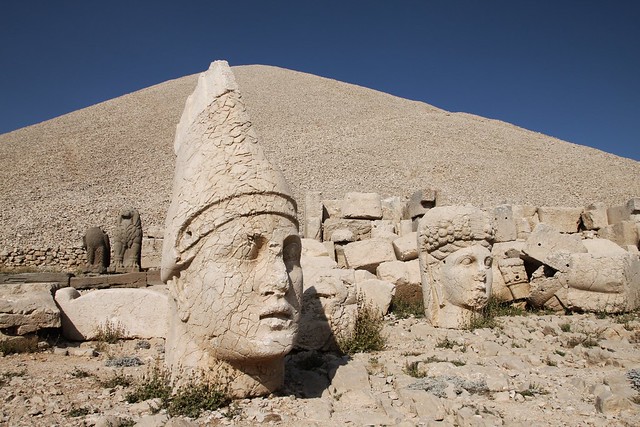

Μετά που επέστρεψε, περίλυπη, απ’ την κηδεία του,
η αδελφή τού εγκρατώς και πράως ζήσαντος,
του λίαν εγγραμμάτου Αντιόχου, βασιλέως
Κομμαγηνής, ήθελ’ ένα επιτύμβιον γι’ αυτόν.
Κι ο Εφέσιος σοφιστής Καλλίστρατος —ο κατοικών
συχνά εν τω κρατιδίω της Κομμαγηνής,
κι από τον οίκον τον βασιλικόν
ασμένως κ’ επανειλημμένως φιλοξενηθείς—
το έγραψε, τη υποδείξει Σύρων αυλικών,
και το έστειλε εις την γραίαν δέσποιναν.
"Του Αντιόχου του ευεργέτου βασιλέως
να υμνηθεί επαξίως, ω Κομμαγηνοί, το κλέος.
Ήταν της χώρας κυβερνήτης προνοητικός.
Υπήρξε δίκαιος, σοφός, γενναίος.
Υπήρξεν έτι το άριστον εκείνο, Ελληνικός—
ιδιότητα δεν έχ’ η ανθρωπότης τιμιοτέραν·
εις τους θεούς ευρίσκονται τα πέραν."
Κωνσταντίνος Π. Καβάφης: "Επιτύμβιον Αντιόχου, βασιλέως Κομμαγηνής"
Το ποιήμα πιθανότατα αναφέρεται στον Αντίοχο Α' Θεό της Κομμαγηνής...[ENG] Constantine Cavafy, "Epitaph of Antiochus, King of Commagene": After she returned, sorrowful, from the funeral, / the sister of the man who lived an abstemious and meekly life, / the highly literate Antiochus, King /of Commagene, she wanted an epitaph for him. / And the Ephesian sophist Callistratus- / who oftened sojourned in the small state of Commagene / and by the royal house / was gladly and repeatedly shown hospitality- / wrote it, according to the suggestions of the Syrian courtiers, / and sent it to the old lady / "Let the glory of Antiochus the benevolent king / be praised worthily, O Commagenians. / He was the country's prudent ruler. / He was just, wise, courageous. / And he was moreover that excellent of all, Hellenic- / humanity has no more honourable quality: / those beyond this are found among the gods.". It is not known who is King Antiochus of this poem, but it is believed that Cavafy refers to Antiochus I Theos of Commagene.








No comments:
Post a Comment